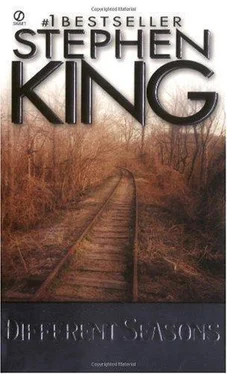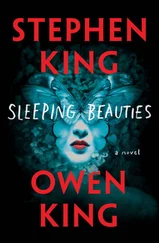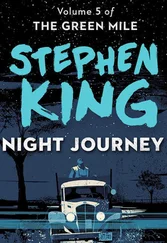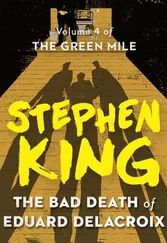When I felt I had myself under control, I went to the rock, squatted beside it - the joints in my knees went off like a double-barrelled shotgun - and let my hand touch it It was real. I didn't pick it up because I thought there would be anything under it; I could just as easily have walked away without finding what was beneath. I certainly had no plans to take it away with me, because I didn't fed it was mine to take - I had a feeling that taking that rock from the field would have been the worst kind of theft. No, I only picked it up to feel it better, to get the heft of the thing, and, I suppose, to prove its reality by feeling its satiny texture against my skin.
I had to look at what was underneath for a long time. My eyes saw it, but it took a while for my mind to catch up. It was an envelope, carefully wrapped in a plastic bag to keep away the damp. My name was written across the front in Andy's clear script.
I took the envelope and left the rock where Andy had left it, and Andy's friend before him.
Dear Red, If you're reading this, then you're out. One way or another, you're out. And If you've followed along this far, you might be willing to come a little further. I think you remember the name of the town, don't you? I could use a good man to help me get my project on wheels.
Meantime, have a drink on me - and do think it over. I will be keeping an eye out for you. Remember that hope is a good thing, Red, maybe the best of things, and no good thing ever dies. I will be hoping that this letter finds you, and finds you well.
Your friend, Peter Stevens I didn't read that letter in the field. A kind of terror had come over me, a need to get away from there before I was seen. To make what may be an appropriate pun, I was in terror of being apprehended.
I went back to my room and read it there, with the smell of old men's dinners drifting up the stairwell to me - Beefaroni, Ricearoni, Noodleroni. You can bet that whatever the old folks of America, the ones on fixed incomes, are eating tonight, it almost certainly ends in roni.
I opened the envelope and read the letter and then I put my head in my arms and cried. With the letter there were twenty new fifty-dollar bills.
And here I am in the Brewster Hotel, technically a fugitive from justice again - parole violation is my crime. No one's going to throw up any roadblocks to catch a criminal wanted on that charge, I guess - wondering what I should do now.
I have this manuscript I have a small piece of luggage about the size of a doctor's bag that holds everything I own. I have nineteen fifties, four tens, a five, three ones, and assorted change. I broke one of the fifties to buy this tablet of paper and a deck of smokes.
Wondering what I should do.
But there's really no question. It always comes down to just two choices. Get busy living or get busy dying.
First I'm going to put this manuscript back in my bag. Then I'm going to buckle it up, grab my coat, go downstairs, and check out of this fleabag. Then I'm going to walk uptown to a bar and put that five dollar bill down in front of the bartender and ask him to bring me two straight shots of Jack Daniels - one for me and one for Andy Dufresne. Other than a beer or two, they'll be the first drinks I've taken as a free man since 1938. Then I am going to tip the bartender a dollar and thank him kindly. I will leave the bar and walk up Spring Street to the Greyhound terminal there and buy a bus ticket to El Paso by way of New York City. When I get to El Paso, I'm going to buy a ticket to McNary. And when I get to McNary, I guess I’ll have a chance to find out if an old crook like me can find a way to float across the border and into Mexico.
Sure I remember the name. Zihuatanejo. A name like that is just too pretty to forget I find I am excited, so excited I can hardly hold the pencil in my trembling hand. I think it is the excitement that only a free man can feel, a free man starting a long journey whose conclusion is uncertain.
I hope Andy is down there.
I hope I can make it across the border.
I hope to see my friend and shake his hand.
I hope the Pacific is as blue as it has been in my dreams.
I hope.
He looked like the total all-American kid as he pedalled his twenty-six-inch Schwinn with the ape-hanger handlebars up the residential suburban street, and that's just what he was: Todd Bowden, thirteen years old, five-feet-eight and a healthy one hundred and forty pounds, hair the colour of ripe corn, blue eyes, white even teeth, lightly tanned skin marred by not even the first shadow of adolescent acne.
He was smiling a summer vacation smile as he pedalled through the sun and shade three blocks from his own house. He looked like the kind of kid who might have a paper route, and as a matter of fact, he did - he delivered the Santa Donato Clarion. He also looked like the kind of kid who might sell greeting cards for premiums, and he had done that, too. They were the kind that come with your name printed inside - JACK AND MARY BURKE, or DON AND SALLY, or THE MURCHISONS. He looked like the sort of boy who might whistle while he worked, and he often did so. He whistled quite prettily, in fact. His dad was an architectural engineer who made $40,000 a year. His mom was a housewife and a secretarial school graduate (she had met Todd's father one day when he needed a secretary from the pool) who typed manuscripts in her spare time. She had kept all of Todd's old school report cards in a folder. Her favourite was his final fourth-grade card, on which Mrs Upshaw had scratched: 'Todd is an extremely apt pupil.' He was, too. Straight As and Bs all the way up the line. If he'd done any better - straight As, for example - his friends might have begun to think he was weird.
Now he brought his bike to a halt in front of 963 Claremont Street and stepped off it. The house was a small bungalow set discreetly back on its lot. It was white with green shutters and green trim. A hedge ran around the front The hedge was well-watered and well-clipped.
Todd brushed his blond hair out of his eyes and walked the Schwinn up the cement path to the steps. He was still smiling, and his smile was open and expectant and beautiful, a marvel of modern dentistry and fluoridated water. He pushed down the bike's kickstand with the toe of one Nike running-shoe and then picked the folded newspaper off the bottom step. It wasn't the Clarion; it was the LA Times. He put it under his arm and mounted the steps. At the top was a heavy wooden door with no window inside of a latched screen door. There was a doorbell on the right-hand doorframe, and below the bell were two small signs, each neatly screwed into the wood and covered with protective plastic so they wouldn't yellow or waterspot. German efficiency, Todd thought, and his smile widened a little. It was an adult thought, and he always mentally congratulated himself when he had one of those.
The top sign said ARTHUR DENKER.
The bottom one said NO SOLICITORS, NO PEDDLERS, NO SALESMEN.
Smiling still, Todd rang the bell.
He could barely hear its muted burring, somewhere far off inside the small house. He took his finger off the bell and cocked his head a little, listening for footsteps. There were none. He looked at his Timex watch (one of the premiums he had gotten for selling personalized greeting cards) and saw that it was twelve past ten. The guy should be up by now. Todd himself was always up by seven-thirty at the latest, even during summer vacation. The early bird catches the worm.
He listened for another thirty seconds and when the house remained silent he leaned on the bell, watching the sweep second hand on his Timex as he did so. He had been pressing the doorbell for exactly seventy-one seconds when he finally heard shuffling footsteps. Slippers, he deduced from the soft wish-wish sound. Todd was into deductions. His current ambition was to become a private detective when he grew up.
Читать дальше











